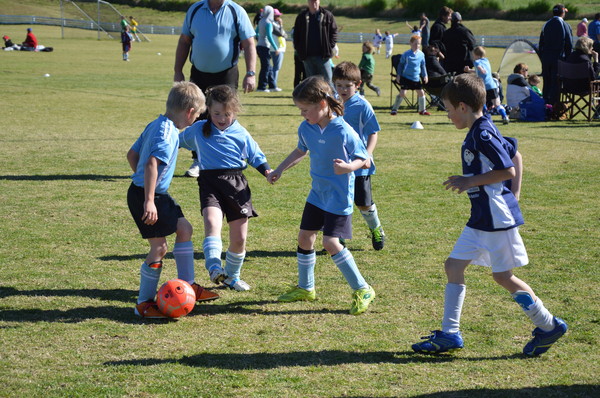Organised sport is a great way for children to participate in regular physical activity.
In addition to the physical fitness benefits, playing sport helps kids learn teamwork and develop confidence, respect and self-esteem. Sport also helps them to understand the value of fair play and how to cope with winning and losing.
Numerous studies have also linked participation in sport to increased academic performance at school.
Playing organised sport is one way you can be sure that your child is getting the regular physical activity they need – and being committed to a team or as a coach means you’re also more likely to regularly attend training and game days.
Most sports offer modified versions for kids, based on their age and skill level. With younger children, the focus is on developing skills and getting everyone playing as much as possible. There is little emphasis on scoring or winning and losing.
The Junior Sport Framework prepared by the Australian Sports Commission provides nine guidelines to assist sports develop their Junior Sport Policies. The goal is to ensure that junior sport environments are safe, fun, quality and inclusive. The guidelines are based on the most current research available.
Sport provides a host of great benefits for kids – they learn new skills, develop confidence, make new friends, play in a team and get physically active.
By making it a fun environment, with opportunities for success and encouragement for all, you can help kids really enjoy their sporting experiences and keep them involved for years to come.
Whether your children are brilliant or just average, the games they play will help them grow.
What parents can do
Parents can help create a positive sporting environment and reduce ‘sport rage’ by being good role models in the following ways:
Encourage fair play
* Cheer and acknowledge good plays by both teams.
* Thank the official, coach and other team after the game.
Respect officials, coaches and opponents
* Accept decisions by officials – they are human and can make mistakes.
* Deal with issues in a controlled and professional manner after the game.
Keep your emotions in check
* Be enthusiastic, but don’t scream instructions from the sideline.
* Don’t get into shouting matches with anyone.
* Never use bad language or harass others.
Uphold your club’s code of conduct
* Understand, uphold and support your club’s code of conduct for parents.
Help kids enjoy sport
* Emphasise trying harder and having fun – not only winning.
* Never ridicule or yell at a child for making a mistake.
Children are always winners when you let them enjoy themselves. The important thing is to encourage them – not push them.
To read more visit www.ausport.gov.au







